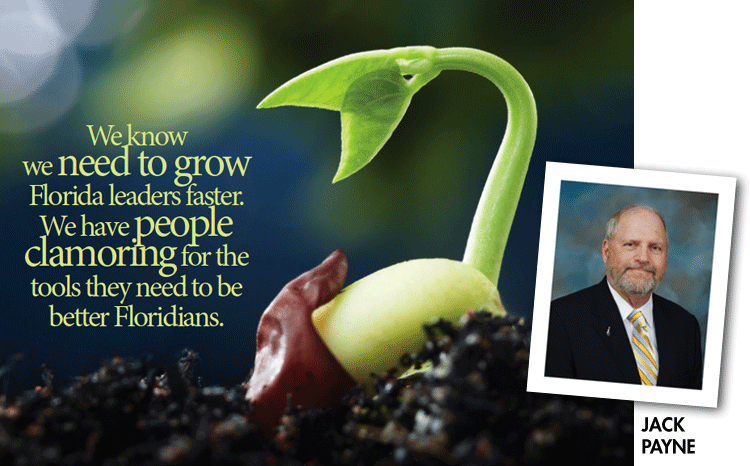How the Legacy Leadership program is helping ensure the future of Florida agriculture
WE KNOW HOW to grow things in Florida — oranges, blueberries, coleus, you name it. Fortunately, we also know how to grow leaders in our agriculture and natural resources industries. Their vision will be essential in how successful we are in feeding Florida and the world … in adapting to climate change … in protecting the natural resources that make agriculture possible and Florida a continuing magnet for visitors.
Just throwing money at challenges isn’t feasible. The challenges are too grand and complex. We have to throw talent at them. It’s a lot more cost-effective to produce homegrown talent than to bid at auction in a national job market. And it assures us that Floridians will lead Florida.
Our leadership programs might produce the most important crop in our state because they help all other crops thrive. It’s the development of visionary, bold, honest, earnest, get-it-done people whose talent multiplies itself by bringing out the talent in others.
Well-executed leadership training also helps grow the economy. That’s why the University of Florida’s Institute of Food and Agricultural Sciences has developed leadership training with an agriculture and natural resources focus.
We can demonstrate an effect. A recent study done by our Wedgworth Leadership Institute for Agriculture and Natural Resources indicates that each person who goes through the yearlong program contributes to creating an average of three jobs. With more nearly 250 alumni, that starts to add up.
We know we need to grow Florida leaders faster. We have people clamoring for the tools they need to be better Floridians. After all, it’s never a good time to delay job creation. Programs such as those of the Wedgworth Leadership Institute are at capacity, though.
The Legislature has the opportunity to grow leaders faster. For less than $900,000, our leadership programs would provide new programming or additional support to an average of 125 students a year and as many as 30 additional graduate degrees in the next decade.
The investment would also provide more slots for an additional 100 leadership program participants in training, such as the Legacy Leadership program that has helped cultivate a new generation of visionaries in the Florida Department of Agriculture and Consumer Services.
Don’t take my word for it. Agriculture Commissioner Adam Putnam gives Legacy the ultimate endorsement. When he’s seeking to fill an important position in a department that is key to Florida’s economy, public health and consumer protection, he turns to his chief of staff and asks, “Do we have a Legacy?”
That question led him to Michael Short. Until last year, Short had served nine years in the same job, a mid-level operative in the FDACS animal division as an equine programs manager. During his year in Legacy, he got promoted to bureau chief and then to state veterinarian, the job his boss’s boss used to have.
Legacy wasn’t the only reason for Short’s sudden rise. But he got the training at just the right time. Short says he couldn’t have developed the skills he got in Legacy from any other program, and certainly not anything so tailored to a career in FDACS. Here’s the other thing Short says. At first, he was hesitant about taking the state veterinarian position. It’s a huge responsibility.
I give half the credit to Commissioner Putnam for helping Short get past his hesitancy. The commissioner is persuasive. It’s tough to sit across a table from him and say no.
But Legacy changed Short’s image of himself. The Legacy training provided by UF/IFAS gave him the confidence to say yes to the state veterinarian job offer and to lead 114 program managers, field inspectors, and veterinarians and other staff as director of the FDACS Division of Animal Industry.
He’s now in a position to use his skills to help hundreds of veterinarians, protect animal health, and support an equine industry, for example, in a state with more horses than Kentucky. He might even grow some jobs. UF/IFAS wants the chance to help produce more Michael Shorts.
Reorganizing our various leadership programs under a single umbrella would help us speed the flow of our homegrown talent pipeline. We start identifying and training leaders as young as five years old through 4-H and making sure people well into their careers continue through their entire working years to bequeath a better Florida.
Leaders are a perennial crop. Like citrus and vegetables, though, they don’t grow without being cultivated. So let’s make sure we have a steady hand on the plow to keep Florida agriculture growing.
CREDIT
article by JACK PAYNE
photo by USDA
ABOUT THE AUTHOR: Jack Payne is the University of Florida’s senior vice president for agriculture and natural resources and leader of the Institute of Food and Agricultural Sciences.

